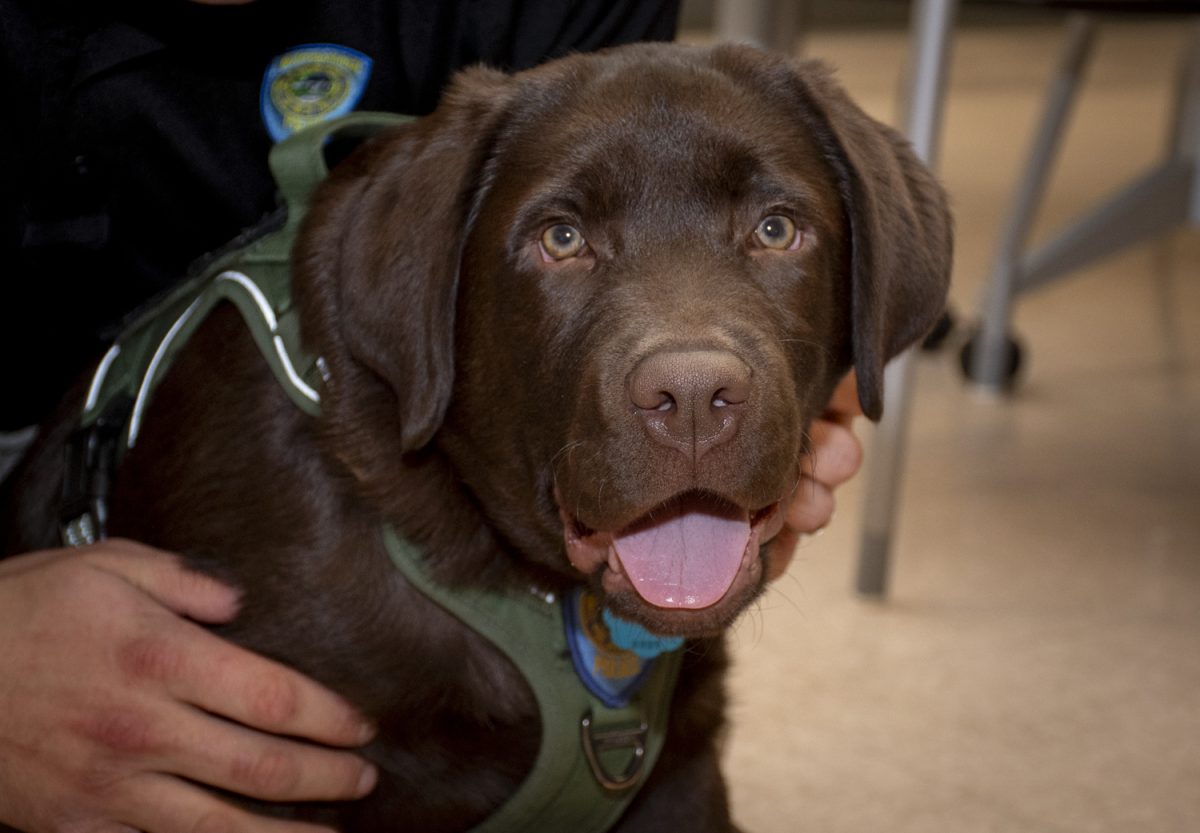Along with Officer Stephen Sullivan’s new chocolate labrador Marshall, Algonquin’s classroom canines continue to brighten people’s days and make a positive impact on students’ mental health.
There are seven therapy dogs across classrooms, ranging from tiny havaneses to large labs. These dogs, who are faculty members’ pets, were all required to be therapy trained and undergo extensive preparation to be allowed in the school. The program began in 2022 when the Northborough/Southborough districts offered access to therapy dog training through the Bright Spot Therapy Dogs program with Melican Middle School Principal and dog trainer Michelle Karb.

Marshall is in training to be a comfort dog at the school and in the wider community. Officer Sullivan believes in the opportunities and guidance that Marshall will be able to bring once he completes his training.
“He learns obedience training, comfort dog training and learns everything to be able to just be calm in big, large group settings to provide aid and relief to victims of traumatic events,” Sullivan said.
Although Marshall is not allowed to be stationed in the school yet, that does not stop him from being part of public events with Sullivan. So far, he has been able to go to grocery stores, senior centers, the fire department, the library and more as a part of his one-on-one training. He even attended this year’s Winter Ball. According to Sullivan, Marshall elicits similar reactions from everyone he meets.
“Whenever Marshall walks in the room, the room just lights up and everyone smiles and they’re like, ‘Oh my gosh, it’s a dog, it’s a puppy,’” Sullivan said.
Because Marshall will finish his comfort dog training on Sept. 6, 2025, students and faculty can expect to see Marshall during the next school year. Officer Sullivan has high hopes for Marshall’s role in the school.
“Marshall will have kind of the same role [as Parker, ARHS’s first comfort dog, who was in the library] to just provide comfort and relief and that break to students and even faculty and staff,” Sullivan said.
Principal Sean Bevan agrees that having properly trained dogs in the school provides stress relief for many students, and he believes that the welcoming environment they create attracts students to school.
“It breaks up a little bit of the repetition of a regular school day to turn the corner and you’re going into your English class, and there’s a dog here who’s happy to greet you,” Bevan said.
Although having dogs at school can have negative aspects due to some community members’ allergies or being a potential distraction, Bevan believes the positives outweigh the negatives and are even greater than he expected.
“It’s almost like there’s a psychological effect,” Bevan said. “It’s like when you hit the jackpot and you weren’t expected to and the benefits are greater than if you were to expect that you were going to win.”
Many students report that the therapy dogs brighten their days and can be an outlet for school stress and anxiety. According to a Harbinger survey of 134 students conducted through Google Forms from Dec. 11 to Dec. 16, 77% of respondents say they have interacted with dogs at the school, and 74% say the dogs have positively impacted their school experience.
“The dogs help to make a less stressful classroom environment,” one survey respondent said.
Other students experience social benefits.
“I think that it’s a great way to bring people together, and it’s always a great break in the class when we pet the dogs,” another survey respondent said.
Adjustment counselor Kelly Viera says her dog, Milo, a two-year-old Cunucu, helps some students who may struggle with shyness or anxiety open up to her and he makes her room more comfortable for them.
“I always find that kids are able to make eye contact with the dog and pet the dog rather than it be like a student and I sitting one-on-one,” Viera said.
English teacher Kathleen Clark has two dogs in her classroom: Sake, a 10-year-old black labrador, and Lulu, a 1-year-old yellow labrador. Clark believes dogs have an overwhelmingly positive influence on her students and that they tend to behave better and be calmer around dogs. Many students come to Clark’s classroom when they are upset to receive “Dog Therapy” from Sake or Lulu.
“They’ll come in and sit with the dog, and a few minutes can turn around your mental mindset and make your day a little better,” Clark said.
This story was originally published on The Harbinger on January 29, 2025.




































